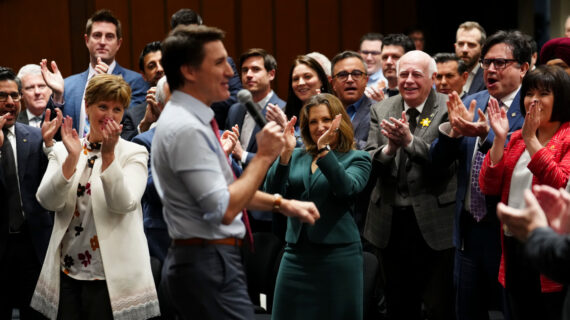- Instead of criticizing the government's subsidy to Volkswagen, Conservative leader Pierre Poilievre focused mostly on the ongoing public service strike.
- Conservative MP Karen Vecchio, whose riding contains the site where the plant will be built, was ribbed by Prime Minister Justin Trudeau at the announcement on Friday.
- An instant immune response to the massive subsidy arose from economists on both the Left and Right, questioning the wisdom of the plan.
When the government promised on Friday to hand $13 billion to Volkswagen to build an electric-vehicle battery plant in southern Ontario, a keen observer of politics could easily imagine the forthcoming attacks from the major opposition parties.
The NDP could continue its populist crusade against wealthy corporations, shifting gears from attacking the billionaire Loblaw president Galen Weston Jr. and moving on to the newest example of alleged corporate welfare.
The Conservatives would surely attack the deal on free market principles, lecturing the government for picking winners and losers in the economy, and blowing up the federal balance sheet in the process.
As it turned out, keen observers could only imagine these critiques because they were never given voice in the House of Commons.
In the three question periods since the subsidies were announced, the Conservatives have held their fire. Conservative leader Pierre Poilievre focused mostly on the low-hanging political fruit, hammering the government on the ongoing public service strike and the simmering controversy around the Trudeau foundation and election interference.
The muted reaction amounts to either an all-party endorsement of the big subsidy or an admission that there’s no easy political hay to be made out of it.
“It’s the silence of the Conservatives and the NDP that really raised my eyebrow on this. It was leaked on Thursday and didn’t come up in question period at all. I couldn’t believe that no one brought it up. It’s astonishing,” said Aaron Wudrick, the director of the Macdonald-Laurier Institute’s domestic policy program, in an interview with The Hub.
Conservative MP Karen Vecchio, whose riding contains the site in St. Thomas, Ontario where the plant will be built, was given a firsthand example of the tricky spot her party finds itself in when Prime Minister Justin Trudeau ribbed her during his speech at the announcement on Friday.
“Karen, I’m glad to see you here and it’s great today that you and I at, least, agree on how much it matters to invest in Canadian workers,” said Trudeau.
“I’ll be direct and honest, you have some work to do to convince your leader, Pierre Poilievre, who thinks this investment is a waste of money,” said Trudeau.
Progressive Conservatives in Ontario have lined up behind it and Premier Doug Ford and Labour Minister Monte McNaughton both attended the announcement on Friday.
McNaughton, who has been courting workers in Ontario for his PC Party, wrote a personal reflection on Twitter about how important the subsidy was, especially because a Ford auto plant in the region had closed in 2010.
That closure was devastating to the community, wrote McNaughton.
“Being pro-worker means being pro-good jobs. Jobs where you can raise a family. Jobs with a retirement plan, or pension, and benefits. Jobs that build communities. Like auto jobs,” wrote McNaughton.
It’s a mistake, though, to view supporting this subsidy as ideologically inconsistent for conservatives, said Mitch Heimpel, the director of campaigns and government relations at Enterprise Canada, in an interview with The Hub.
“We’ll see a significant imprint from that company on the community. These larger manufacturers do more than just employ people. There’s a whole culture that gets created around it,” said Heimpel.
Conservatives should care just as much about the social fabric and small communities as the free market, argued Heimpel.
Wudrick worried about the consequences of the government providing financial incentives for smaller communities to put all their employment eggs in one basket.

“You’re setting them up for future hostage-taking. You’re setting these communities up to get mowed down in the future and I think that’s dangerous,” said Wudrick, who warned of a scenario down the road when Volkswagen threatens to pick up shop and move if it doesn’t get more government money.
The massive subsidy to Volkswagen provoked something of a rare moment, when credentialed experts were lining up, almost in one voice, against a government plan, a mirror image of the political response in favour of it.
An instant immune response arose from economists on both the Left and Right, questioning the wisdom of the plan.
Given Canada’s tight labour market, these subsidies won’t so much create jobs as shift workers around towards the higher-paying subsidized paycheques, wrote Stephen Gordon, a professor of economics at Laval University.
“Firms in Southwestern Ontario who can’t compete with the subsidised wages offered by Volkswagen will be the big losers here,” wrote Gordon.
Rob Gillezeau, a professor of economics at the University of Toronto, questioned the government’s math on how many jobs would arise from the plan, saying it was likely basing its case on “wildly flawed modelling from a bunk economic tool.”
“If the federal government wants to make some kind of national security or geopolitical case they should go for it because the economic rationale really isn’t there,” wrote Gillezeau.




